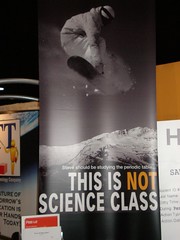I was sorry that I was unable to attend the
Model Schools Conference in Washington, DC this past week. If there is anywhere edubloggers need to be it is there! I am fortunate in my district to have some really dynamic leaders who have "future vision" who attended the conference and starting to set the
wagon in motion.
Because of my trip to NECC, I was following based on the
wiki and
blog of a friend who's district is committed to a
Rigor & Relevance Framework. One thing that disturbed me was that in a conference for building rigor, relevance and 21st C skills...Jen noted there was no wireless and she only witnessed four other conference attendees who recorded their notes on a laptop. None-the-less if you are interested in learning more about Daggett--check out the links above. I think it is important to point out that t was during the nightly round-table discussions and dinners with the district’s team of 18 administrators and staff development facilitators that the really significant conversation occurred. (kind of like blogger cafe, or dinner conversations at NECC) If there is one thing I can suggest is that district teams attend conferences TOGETHER--be it NECC, PETE & C, Model Schools, Governor's Institute for Innovation and Education, Educon2.0....WHATEVER so that they can have TIME to discuss the impact of the session information on the district’s leadership.
from Jen Dorman's notes...the things that stood out for me as we start to build a plan to move forward...
Students who perform well in our school system do not necessarily perform well in life – skills valued in school are not the core skills and values in real lifeThe primary aim of education should not be to enable students to do well in school, but to help them do well in the lives they lead outside of school. They are good at studying to learn, but are they really ready to work? I kept seeing repeated that the top 5 new-hire skills included: Communication skills, honesty/integrity, teamwork, interpersonal, strong work ethic.
Kids need to learn from others – even if they are not like you . . .I recall an activity during I believe it was
Alan November's session at NECC where we were asked to recall the names of faces...alone it was difficult, but together... You can’t teach kids you don’t know . . . relationships (Carol Ann Tomlinson), relationships are foundational to designing educational experiences that are appropriately rigorous and relevant
According to Jen's notes, the Model School Sessions did suggest some things to leave behind – industrial model of education, low expectations for students (esp. special education and ELL), pure disciplines (content), trainings not attended by leadership (if it’s important enough for them to be here, it’s important enough for you to be here), “this is the way we have always done it”, assign teachers based on seniority, using state assessments as the solution to the problem--WOW, some heavy ideas here...definitely a team decision...
Ian Jukes at NECC referred to it as
TTWADI (that's the way we always did it)
Highly effective teachers teach very little – they are facilitators of R/R learning--once again a concept that was reinforced at NECC..
Other countries invest in global skills:
* most other industrial countries start world language instruction in primary grades
* international benchmarking and exchange
* technology
* study abroad programs
I read about the importance of Professional Development. One school described the layers of support:
* 3 days of preservice induction
* 10 days of orientations for lateral entries (not trained to be teachers, career changes)
* School based orientation
* School based mentors
* M & M Meetings – mentor/mentee (monthly school based social/professional development) – help them to develop relationships to keep them in-district
* Peer classroom observations and feedback (praise and constructive criticism)
* BTI Lead Teacher Walk Thrus
* Opportunities to observe other peers
* Weekly contact w/school-based mentor
* Moodle . . .
Chris Lehman and
Karl Fisch both described similar types of opportunities in their success stories
For many schools it was a FOUR YEAR PROCESS
1. Identify leaders (top-down support) who recognize the need for school/state-wide change
2. Develop partnerships Involve the community
3. Determine guiding principles (ICLE kit contains 12)
4. Establish plan (mission statement and vision, strategic plan involving all students, parents, and staff)
5. Develop advisory boards who can implement practices (organic and natural component of curriculum and instruction)
6. Focus on professional development
Again, I was not there...just reading notes and reflections but it seems to me that the Model Schools, Administrators, Edubloggers....are all speaking the same language, they are just doing it in different places...Scott McLeod suggested we
blog leadership for Independence Day --He has some great starting points on his blog
today. It will be exciting to all sit down together, compare notes, put the wheels on the wagon (or restructure as the case may be) and get movin'
















